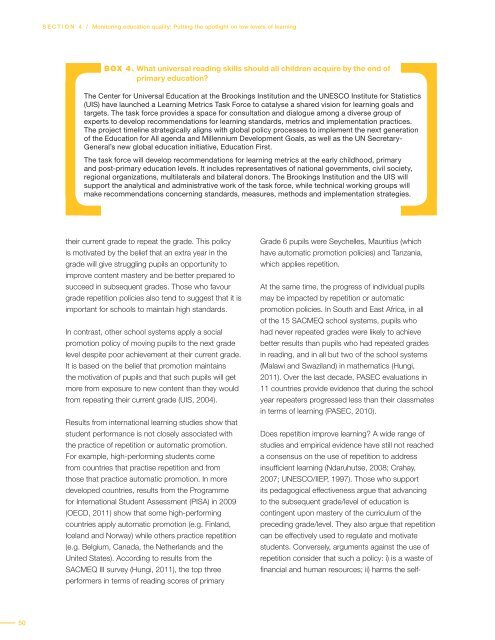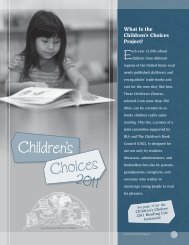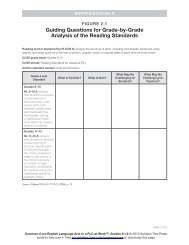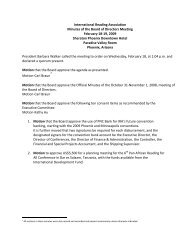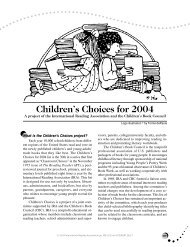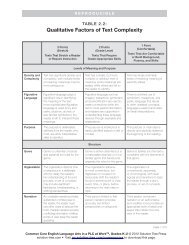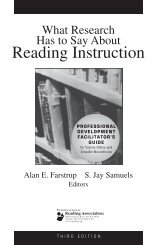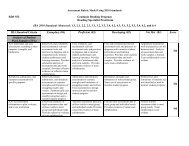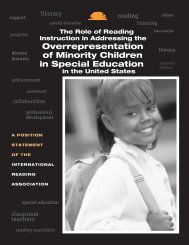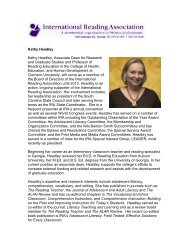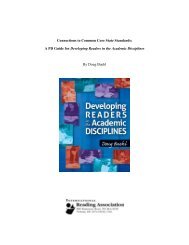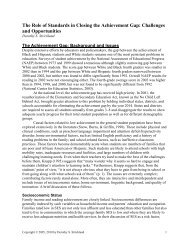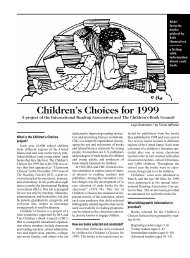Global Education Digest 2012 - International Reading Association
Global Education Digest 2012 - International Reading Association
Global Education Digest 2012 - International Reading Association
Create successful ePaper yourself
Turn your PDF publications into a flip-book with our unique Google optimized e-Paper software.
SECTION 4 / Monitoring education quality: Putting the spotlight on low levels of learning<br />
BOX 4. What universal reading skills should all children acquire by the end of<br />
primary education?<br />
The Center for Universal <strong>Education</strong> at the Brookings Institution and the UNESCO Institute for Statistics<br />
(UIS) have launched a Learning Metrics Task Force to catalyse a shared vision for learning goals and<br />
targets. The task force provides a space for consultation and dialogue among a diverse group of<br />
experts to develop recommendations for learning standards, metrics and implementation practices.<br />
The project timeline strategically aligns with global policy processes to implement the next generation<br />
of the <strong>Education</strong> for All agenda and Millennium Development Goals, as well as the UN Secretary-<br />
General’s new global education initiative, <strong>Education</strong> First.<br />
The task force will develop recommendations for learning metrics at the early childhood, primary<br />
and post-primary education levels. It includes representatives of national governments, civil society,<br />
regional organizations, multilaterals and bilateral donors. The Brookings Institution and the UIS will<br />
support the analytical and administrative work of the task force, while technical working groups will<br />
make recommendations concerning standards, measures, methods and implementation strategies.<br />
their current grade to repeat the grade. This policy<br />
is motivated by the belief that an extra year in the<br />
grade will give struggling pupils an opportunity to<br />
improve content mastery and be better prepared to<br />
succeed in subsequent grades. Those who favour<br />
grade repetition policies also tend to suggest that it is<br />
important for schools to maintain high standards.<br />
In contrast, other school systems apply a social<br />
promotion policy of moving pupils to the next grade<br />
level despite poor achievement at their current grade.<br />
It is based on the belief that promotion maintains<br />
the motivation of pupils and that such pupils will get<br />
more from exposure to new content than they would<br />
from repeating their current grade (UIS, 2004).<br />
Results from international learning studies show that<br />
student performance is not closely associated with<br />
the practice of repetition or automatic promotion.<br />
For example, high-performing students come<br />
from countries that practise repetition and from<br />
those that practice automatic promotion. In more<br />
developed countries, results from the Programme<br />
for <strong>International</strong> Student Assessment (PISA) in 2009<br />
(OECD, 2011) show that some high-performing<br />
countries apply automatic promotion (e.g. Finland,<br />
Iceland and Norway) while others practice repetition<br />
(e.g. Belgium, Canada, the Netherlands and the<br />
United States). According to results from the<br />
SACMEQ III survey (Hungi, 2011), the top three<br />
performers in terms of reading scores of primary<br />
Grade 6 pupils were Seychelles, Mauritius (which<br />
have automatic promotion policies) and Tanzania,<br />
which applies repetition.<br />
At the same time, the progress of individual pupils<br />
may be impacted by repetition or automatic<br />
promotion policies. In South and East Africa, in all<br />
of the 15 SACMEQ school systems, pupils who<br />
had never repeated grades were likely to achieve<br />
better results than pupils who had repeated grades<br />
in reading, and in all but two of the school systems<br />
(Malawi and Swaziland) in mathematics (Hungi,<br />
2011). Over the last decade, PASEC evaluations in<br />
11 countries provide evidence that during the school<br />
year repeaters progressed less than their classmates<br />
in terms of learning (PASEC, 2010).<br />
Does repetition improve learning? A wide range of<br />
studies and empirical evidence have still not reached<br />
a consensus on the use of repetition to address<br />
insufficient learning (Ndaruhutse, 2008; Crahay,<br />
2007; UNESCO/IIEP, 1997). Those who support<br />
its pedagogical effectiveness argue that advancing<br />
to the subsequent grade/level of education is<br />
contingent upon mastery of the curriculum of the<br />
preceding grade/level. They also argue that repetition<br />
can be effectively used to regulate and motivate<br />
students. Conversely, arguments against the use of<br />
repetition consider that such a policy: i) is a waste of<br />
financial and human resources; ii) harms the self-<br />
50


